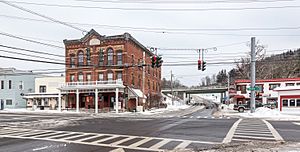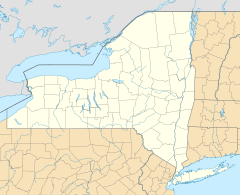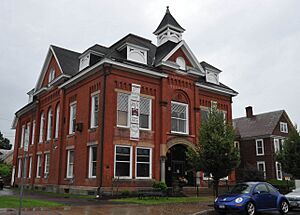Marathon (village), New York facts for kids
Quick facts for kids
Marathon, New York
|
|
|---|---|

Broome St and Main St in Marathon Village
|
|
| Country | United States |
| State | New York |
| County | Cortland |
| Town | Marathon |
| Area | |
| • Total | 1.13 sq mi (2.93 km2) |
| • Land | 1.13 sq mi (2.93 km2) |
| • Water | 0.00 sq mi (0.01 km2) |
| Elevation | 1,024 ft (312 m) |
| Population
(2020)
|
|
| • Total | 892 |
| • Density | 789.38/sq mi (304.89/km2) |
| Time zone | UTC-5 (Eastern (EST)) |
| • Summer (DST) | UTC-4 (EDT) |
| ZIP code |
13803
|
| Area code(s) | 607 |
| FIPS code | 36-45392 |
| GNIS feature ID | 0956488 |
Marathon is a small village located in Cortland County, New York, United States. It is part of the larger town of Marathon. In 2020, the village had a population of 892 people.
Contents
Exploring Marathon's Past
The village of Marathon was officially formed in 1861. It is located within an area that was once part of the Central New York Military Tract. This was land set aside for soldiers after the American Revolutionary War.
Each spring, Marathon hosts a fun "Maple Festival." This event celebrates the sweet syrup made from maple trees. Two important historic buildings in the village are the Peck Memorial Library and the Tarbell Building. Both are listed on the National Register of Historic Places, meaning they are recognized for their historical importance.
Where is Marathon Located?
Marathon village is in the western part of the town of Marathon. It sits where several major roads meet. These include U.S. Route 11, Interstate 81, and New York State Route 221.
If you travel north on I-81, you can reach Cortland in about 14 miles. Cortland is the main city and government center for the county. Traveling south on I-81, you can get to Binghamton in about 26 miles.
The village covers an area of about 1.13 square miles (2.9 square kilometers). Only a tiny part of this area is covered by water. The Tioughnioga River flows south through the village. This river is part of the larger Susquehanna River system.
Marathon's Population Over Time
| Historical population | |||
|---|---|---|---|
| Census | Pop. | %± | |
| 1870 | 871 | — | |
| 1880 | 1,006 | 15.5% | |
| 1890 | 1,198 | 19.1% | |
| 1900 | 1,092 | −8.8% | |
| 1910 | 1,079 | −1.2% | |
| 1920 | 565 | −47.6% | |
| 1930 | 860 | 52.2% | |
| 1940 | 955 | 11.0% | |
| 1950 | 1,057 | 10.7% | |
| 1960 | 1,079 | 2.1% | |
| 1970 | 1,053 | −2.4% | |
| 1980 | 1,046 | −0.7% | |
| 1990 | 1,107 | 5.8% | |
| 2000 | 1,063 | −4.0% | |
| 2010 | 919 | −13.5% | |
| 2020 | 892 | −2.9% | |
| U.S. Decennial Census | |||
In 2000, there were 1,063 people living in Marathon village. The population density was about 941 people per square mile. Most residents were White, with small percentages of other racial groups. About 0.56% of the population identified as Hispanic or Latino.
Many households in Marathon included families. About 36% of households had children under 18 living there. The average household had about 2.54 people. The average family had about 3.03 people.
The population included people of all ages. About 29% were under 18 years old. About 13% were 65 years or older. The average age in the village was 36 years old.
Learning in Marathon
The Peck Memorial Library
The Peck Memorial Library is a beautiful old building in Marathon. It is a two-and-a-half-story brick building. It was built between 1894 and 1895. The library has a unique style, typical of buildings from the late Victorian era.
Mrs. Mercena Brink Peck left money in her will in 1891 for the library to be built for the people of Marathon. The library was added to the National Register of Historic Places in 1992.
See also
 In Spanish: Marathon (villa) para niños
In Spanish: Marathon (villa) para niños
 | Jackie Robinson |
 | Jack Johnson |
 | Althea Gibson |
 | Arthur Ashe |
 | Muhammad Ali |



